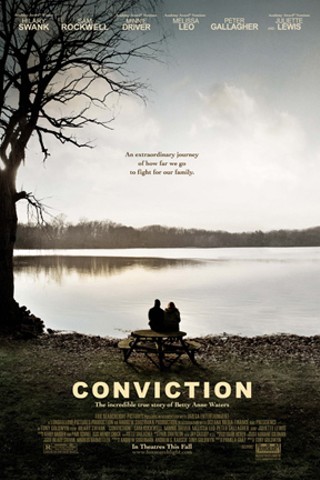The words "based on a true story"—or the classed-up "inspired by a true story"—are now imprinted on the opening credits of quite a few films. The number of movies that are spawned from actual events is spreading like a virus, if Wikipedia can be believed: The total more than doubled from the 1990s to the first decade of this century.
The difficulty for a lot of these films is that only a germ of the real story makes for a compelling movie plot, so lots of facts are ginned up, or inconvenient characters are omitted in favor of something that zings a little more. Given the existence of a 24-hour news cycle and, well, Wikipedia (plus more reliable clearinghouses for information), it's easier than ever for audiences to double-check the stories to see if a movie "based on a true story" is instead merely springboarding from a true story.
In the case of Conviction, the good news is that all of the major points seem to line up. In 1983, Kenny Waters (Sam Rockwell) was sentenced to life for a brutal murder outside of Boston. He had always been in trouble with the law, but mainly for minor things; usually, Waters was merely held, questioned and released. This time, it was different, although the crime seemed too heinous for a goofy, fun-loving screw-up like Kenny Waters.
His sister, Betty Anne (Hilary Swank), thought so, too. But Kenny couldn't afford a good defense team, and the public defender was more of a turnstile than an obstacle to a guilty verdict. Therefore, Kenny Waters would spend the rest of his life in prison, despite a lack of physical evidence, shady witnesses and an alibi.
Betty Anne fought back. She finished her undergraduate work and then attended law school, passed the bar and began investigating the case on her own.
Even if the real story stopped there, this idea would have legs. It's certainly good enough for a made-for-cable flick. But unfortunately, even though there is more story to tell, Conviction feels like one of those Lifetime original movies instead of something special.
Supporting the strange-but-true story are Swank and Rockwell, who at times in their careers have been unbelievable and fearless. Swank has two Oscars and rightly earned both of them, for her breakthrough role in Boys Don't Cry and in Clint Eastwood's Million Dollar Baby. Outside of those movies, though, it's hard to pin down a truly great Hilary Swank performance, and it doesn't materialize here, either. She is certainly focused as Betty Anne, and her accent fits more snugly than whatever it was that possessed her larynx in last year's Amelia, but this is merely a solid piece of work with no revelation.
Sam Rockwell has never been a mainstream star, although he stole three mainstream films in very short order about a decade ago (The Green Mile, Galaxy Quest and Charlie's Angels). Usually a supporting player outside of the independent world, perhaps Rockwell's signature work is the strange and beautiful embodiment of game-show-host/alleged CIA agent Chuck Barris in Confessions of a Dangerous Mind. He was also fantastic in last summer's Moon.
However, Rockwell and Swank are speaking different acting languages in Conviction. It's less obvious when Rockwell is not onscreen, but when the two stars are together, it jumps out that Swank is bucking for another nomination by throwing key punches, while Rockwell is trying to imbue a character with real depth, anger, sadness, frustration and helplessness. All of that would be great if the movie in question were Dead Man Walking, but this is not an actor's paradise, and whether or not it is intended to be doesn't mean much when it's apparent that director Tony Goldwyn hasn't crafted it to be.
Rockwell's portrayal of a man hoping against hope for a reprieve, but realizing how big those odds are, isn't hitting the same notes as everything that surrounds it. His creation takes more time to mature than he's allowed, and the scenes between him and his co-star ought to be twice as long. Instead, Goldwyn blows a good five or six minutes on a meandering and unintentionally funny monologue by Juliette Lewis, cast as a witness who changes her story over time. It subverts the serious nature of Conviction and adds next to nothing about the story of Kenny and Betty Anne Waters that we need to see.
Ultimately, the film is too by-the-numbers to have any lasting impact. It follows the steps the Hollywood formulas dictate, and it squanders a possibly great performance by Rockwell by sticking it in a movie where it looks out of place. It may be based on her story, but the one thing Conviction truly lacks is, ironically enough, Betty Anne Waters' conviction.











